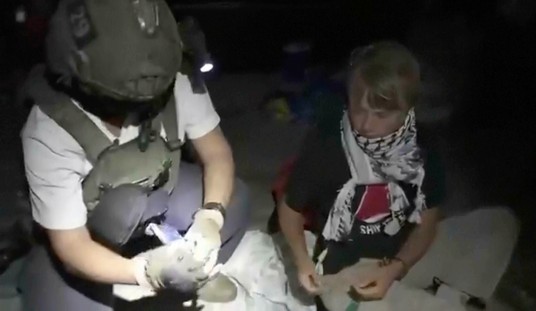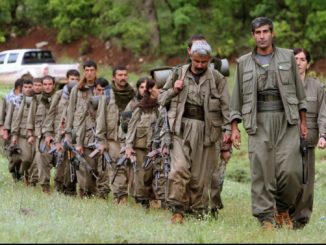
Published October 3, 2025
Israeli naval forces intercepted 39 vessels from the Global Sumud Flotilla on Thursday, detaining dozens of activists—including prominent climate advocate Greta Thunberg and several European lawmakers. The flotilla, comprising over 40 boats and approximately 500 participants, aimed to deliver humanitarian aid to Gaza, challenging Israel’s longstanding naval blockade. The interception occurred during Yom Kippur, the holiest day in the Jewish calendar.
Israel’s Ministry of Foreign Affairs released images showing Thunberg detained alongside Israeli soldiers. The government contends that the flotilla carried no aid and was instead a publicity stunt, with the primary objective being to garner media attention rather than provide humanitarian assistance.
The flotilla’s organizers, however, assert that their mission was genuine, aiming to alleviate the humanitarian crisis in Gaza. Despite Israel’s claims, the organizers maintain that the flotilla’s purpose was to deliver aid and draw international attention to the situation in Gaza.
Following the interception, only one vessel from the flotilla remained en route to Gaza. Activists reported that the remaining boat was last tracked just a few miles off Gaza’s coast before communication was lost. The Israeli military has not commented on the status of this last vessel.
The incident has sparked international debate about the legality and efficacy of such flotillas in delivering aid to Gaza, as well as the broader implications for humanitarian efforts in conflict zones.
 Public / Political Reactions
Public / Political Reactions
🌍 Global Protests and Public Outcry
Protests erupted across Europe, Latin America, and Asia in response to the Israeli military’s actions. In Italy, dockworkers in Livorno refused to service Israeli-owned ships, and a general strike was called by the major trade union Cgil. In Spain, thousands marched on the Israeli consulate in Barcelona, while in the UK, students occupied university buildings in solidarity with Gaza .
In Sweden, several detainees, including Greta Thunberg, began a hunger strike in protest against their conditions in Ketziot prison, where they reported extended interrogations without access to food, water, or legal representation.
🏛️ Political Reactions
Israel: The Israeli government defended its actions, labeling the flotilla a provocation and asserting that the activists were not interested in delivering aid but in challenging Israel’s sovereignty. Israeli officials claimed that the flotilla had ties to Hamas, though these allegations have been met with skepticism from international observers.
European Union: The European Union has expressed concern over the incident, with some member states urging Israel to respect international law and human rights. However, the EU’s response has been criticized as insufficiently robust by some human rights organizations.
United States: The U.S. government has largely supported Israel’s right to enforce its blockade of Gaza, with some lawmakers condemning the flotilla as a publicity stunt. Senator Lindsey Graham’s remark, “Hope Greta and her friends can swim,” was perceived by many as a threat of military action against the activists.
🧭 Humanitarian and Legal Perspectives
Human rights organizations have condemned Israel’s actions, describing the interception as a violation of international law and an infringement on the right to provide humanitarian aid. The flotilla’s organizers maintain that their mission was peaceful and aimed solely at delivering essential supplies to Gaza’s civilian population.
 Resulting Effects
Resulting Effects
🌍 Humanitarian Impact
-
Aid Disruption: The flotilla aimed to deliver essential humanitarian supplies to Gaza. Its interception delayed or entirely prevented aid from reaching the civilian population.
-
Public Awareness: Despite being stopped, the flotilla garnered significant global attention, highlighting the humanitarian crisis in Gaza and putting international pressure on Israel.
-
Activist Morale: Detained activists, including Thunberg, have reported harsh conditions in detention, such as hunger strikes and restricted access to legal counsel, which could influence future advocacy efforts.
🏛️ Political and Diplomatic Effects
-
Israel’s Stance Reinforced: Israel demonstrated its commitment to enforcing the naval blockade of Gaza, reinforcing its security and sovereignty claims.
-
International Criticism: Governments and human rights organizations condemned Israel, claiming the interception violated international law and the principle of delivering humanitarian aid.
-
Tension in EU-Israel Relations: Some European countries criticized Israel’s actions, creating diplomatic friction, particularly with Sweden, where Thunberg is from, and other EU states sympathetic to humanitarian causes.
📢 Public Opinion and Activism
-
Global Protests: Mass protests erupted across Europe, Latin America, and Asia. Dockworkers, students, and NGOs expressed solidarity with Gaza and the detained activists.
-
Media Coverage: Widespread news coverage and social media attention amplified the flotilla’s message, potentially inspiring future humanitarian missions or political activism targeting the Gaza blockade.
-
Polarization: The flotilla highlighted polarized opinions: supporters saw it as a courageous humanitarian effort, while critics labeled it a publicity stunt or a provocation.
⚖️ Legal and Policy Implications
-
Debate on Humanitarian Access: Legal experts and NGOs raised questions about the legality of Israel’s blockade versus the right to deliver humanitarian aid in conflict zones.
-
Potential Policy Changes: The incident could trigger discussions in international forums about safer and more legally compliant methods to provide aid to Gaza.
-
Detention Precedent: The treatment of detained activists may influence future flotillas or activist missions in terms of security measures and international legal oversight.
🧭 Long-Term Effects
-
Activist Strategy Shift: Future humanitarian campaigns may adopt more cautious approaches, such as working through international organizations or seeking diplomatic channels.
-
Continued International Scrutiny: Israel’s blockade and the humanitarian situation in Gaza remain under global watch, with increased media attention likely influencing future policy and public opinion.
-
Reinforced Advocacy: Greta Thunberg’s involvement ensures the event remains prominent in environmental and humanitarian activism circles, possibly inspiring intersectional advocacy for climate, peace, and human rights.
 Future Outlook
Future Outlook
🌍 Humanitarian Outlook
-
Aid Delivery Challenges: Future attempts to deliver humanitarian aid to Gaza via sea may face increased Israeli enforcement, requiring alternative delivery methods (e.g., land crossings or international NGO coordination).
-
Humanitarian Awareness: Global attention on Gaza is likely to remain elevated, with the flotilla acting as a catalyst for campaigns to support civilian populations.
-
Activist Strategy Adaptation: Humanitarian and environmental activists may develop more sophisticated, legally compliant approaches to aid delivery to minimize detention risks.
🏛️ Political and Diplomatic Outlook
-
Heightened Diplomatic Tensions: Relations between Israel and EU countries (especially Sweden) could see friction if similar flotilla attempts continue, potentially prompting negotiations over humanitarian access.
-
Policy Reevaluation: Israel may strengthen its naval blockade policies and security protocols, while international bodies might consider clearer guidelines for humanitarian flotillas.
-
Influence on International Law Discussions: The interception could lead to renewed debates at the UN or other forums on balancing state security with humanitarian obligations in conflict zones.
📢 Public Opinion and Activism Outlook
-
Sustained Global Advocacy: Greta Thunberg’s involvement ensures the incident remains a touchpoint for international activism, potentially inspiring campaigns linking climate, human rights, and peace initiatives.
-
Polarization Continues: Public debate over activist-led flotillas is likely to remain polarized, with some viewing them as heroic humanitarian efforts and others as provocations or political stunts.
-
Social Media Amplification: Online platforms will continue to play a key role in shaping narratives, mobilizing protests, and influencing international public opinion.
⚖️ Legal and Security Outlook
-
Increased Legal Scrutiny: Future flotilla attempts may face preemptive legal challenges or stricter international regulations to ensure safety and compliance with maritime law.
-
Detention Precedent Impact: Israel’s handling of detained activists may serve as a precedent, influencing both activist risk assessments and government responses to similar events.
-
Potential for Negotiation Channels: Humanitarian organizations might push for formal agreements with Israel to allow aid delivery under monitored conditions, reducing confrontation risks.
 Bottom Line:
Bottom Line:
The interception of the Global Sumud Flotilla by Israeli forces, including the detention of Greta Thunberg and other activists, has sparked international debate over humanitarian aid, state security, and activist strategies. While the flotilla was prevented from delivering supplies to Gaza, it succeeded in drawing global attention to the humanitarian crisis and highlighting the tension between international advocacy and national sovereignty. Moving forward, the incident is likely to shape the approach of humanitarian missions, influence diplomatic discussions, and fuel ongoing activism, leaving a lasting imprint on both public opinion and policy regarding aid to conflict zones.
SOURCES: FOX NEWS – Israeli military arrests Greta Thunberg, flotilla activists after intercepting dozens of boats
REDSTATE – Watch: Israel Intercepts Greta Thunberg’s Gaza-Bound Selfie Flotilla





Be the first to comment